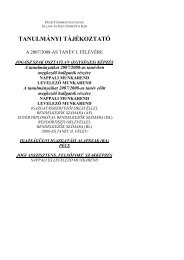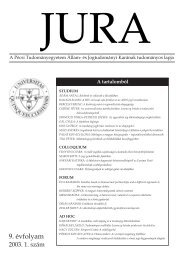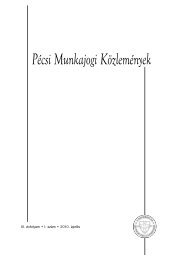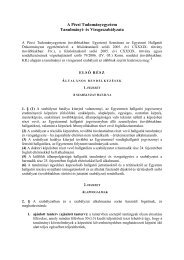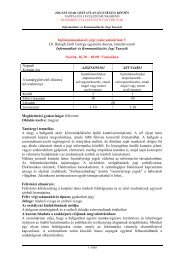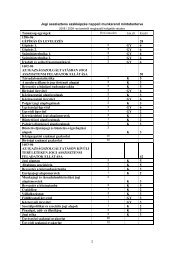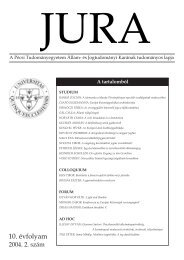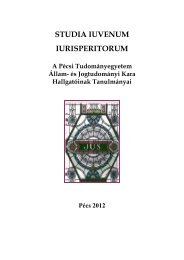136 Király Lilla: A keresetjog elméletek érvényesülése a joggyakorlatban165Moór Gyula: i.m. 1923. 33. o.166Moór Gyula: i.m. 1923. 34. o.167A normarendszer az a séma, amely alapján egy konkrétjogi norma értelmezhetővé válik.168Rosenberg Leo: i.m. 1927. 259.o. Kengyel Miklós: i.m.1986. 553. o.169Kengyel Miklós: i.m. 1986. 554. o.170Kengyel Miklós: i.m. 1989. 138. o.171Vö. Lábady Tamás: A keresetindítási jog, különös tekintettela III. Ppn. új előfeltételeire. Magyar Jog és KülföldiJogi Szemle 1975. 9. sz. 445. o.172Pp. 130.§(1) bekezdés, Pp.157.§173Vö. Lábady Tamás: i.m. 1975. 447-453. o.174Lábady Tamás: i.m. 1975. 449. o.17559/1993. (XI.29) AB határozat176ABH 1993.355, Kengyel Miklós: A keresetindítás In: Apolgári perrendtartás magyarázata 1. In: Németh János – KissDaisy (szerk.), Második átdolgozott kiadás, CompLex Kiadó,Budapest 2006. 720-721. o.177195<strong>2.</strong>évi III. tv. 121.§ (1) bek. c) pont178195<strong>2.</strong>évi III. tv. 130.§ (1) bek. j) pont179Bírósági határozat: BH. 1988. évi 3/109. s.m., forrás:Kengyel Miklós: i.m. 2006. 805. o.180Pl. a felperes az alperes lakcímének téves megjelölésétkövetően a hiánypótlásban közli a bírósággal, hogy az alpereshelyes címét nem tudja megjelölni (Legfelsőbb Bíróság Gf. V.30 518/1988 – BH 1988. évi 11/414.sz.) forrás: i.m. KengyelMiklós 2006.805.o.181Pp. 130.§ (1) bekezdés g) pont182Pl. személyállapottal kapcsolatos perek, kényszerűpertársaság esetei (tulajdonostársak)183BH 2001.388, BH 2001.201,, BH. 1999.18<strong>2.</strong> forrás: KengyelMiklós 2006.80<strong>2.</strong>o.184Kiss Daisy: Hol az igazság? Kételyek és aggályok a Polgáriperrendtartás utóbbi módosítása kapcsán. http://www.kissdaisyestarsa.hu/pub/daisy_holazigazsag.pdf.(2011.05.19.)185A Polgári perrendtartást módosító 1999.évi CX. törvény186Bíróságnak a tárgyi valóságot tükröző objektív igazságotakkor is meg kellett állapítania, ha bármelyik fél nemtett eleget a bizonyítási kötelezettségének. Farkas József: i.m.1956. 23-27.o., Kengyel Miklós: i.m. 2008. 33. o.187Az Alkotmánybíróság már egy 199<strong>2.</strong> évi határozatábankimondta, hogy az anyagi igazság kiderítésére nincs alkotmányosgarancia: “Az Alkotmány a bírósági eljáráshoz biztosítalanyi jogot és nem azt garantálja, hogy annak eredményeminden esetben helyes lesz.” (9/1992 (I.30.) AB határozat) Amagyar Alkotmánybíróság értelmezése szerint a „tisztességeseljárás” követelménye magában foglalja a bírósággal és az eljárássalszemben megkövetelt tulajdonságokat (pl. „igazságostárgyalás”) és egyben biztosítja az Alkotmányban írt valamennyieljárási garancia érvényesülését is (esélyegyenlőség;független és pártatlan bíróság biztosítása a felek részére, ügyekésszerű időn belüli elbírálása a bíróság részéről). (6/1998(III.11.) AB határozat), Kiss Daisy: i.m. 2011188Pp.114/A-114/B.§.189Pp. 114/A.§.(2) bek. a)-c) pontok190kivétel ez alól a státus-perek csoportja191Pp. <strong>2.</strong>§ (1) bekezdés vö. Kiss Daisy: i.m. 2011192A polgári perrendtartást módosító 1999.évi CX törvény193Kiss Daisy: i.m. 2011194„A jog a jó és méltányos művészete” („Ius est ars boniet aequi”).Ulpianus D.1.1.1.1.195Moór Gyula: i.m. 1923. 34. o.196A tiszta jogtan célja, hogy politikai, etikai, erkölcsi,és természettudományos felfogástól mentes, és azoktól élesenelhatárolódó jogtudományt teremtsen, a „Sein” (valóság,a „van” világa) és a „Sollen” (érték, a „legyen” világa) megkülönböztetésével.Kelsen Hans: Reine Rechtslehre, Zweite, vollständigneu bearbeitete und erweiterte Auflage 1960, NachdruchÖsterreichische Staatsdruckerei, Wien 1992197i.m. Kengyel Miklós 2006. 713.o.198Pp. 121.§ (1) bek.199Pp.139.§200Pp. 141.§ (6) bek.201Pp. 141.§ (2) bek.202Álláspontom szerint erre jó példák az angol „payment-into-court”rendszer vagy az amerikai Michigan Mediationmechanizmus.A „payment-into-court” rendszer: Az alperes felajánl egyösszeget a felperesnek. Ha a felperes elfogadja az összeget,véget ér a per. Ha azonban a felperes visszautasítja az ajánlatot,és az eljárás végén neki ítélt összeg kevesebb, mint amitaz alperes felajánlott, ő fizeti a saját költségein felül az alperesköltségeit is az ajánlat napjától kezdve. Ha a felperesnek a felajánlottnálnagyobb összeget ítélnek meg, akkor úgy tekintikmintha az alperes nem tett volna ajánlatot. Capelletti, Mauro:i.m. 1976. 708. o.A Michigan-rendszer: ha a felperes a kártérítési ügyekbennem fogadja el az alperes által felajánlott kártérítési összeget,az eljárás végén a felajánlott összeg minimum 110 százalékánakmegfelelő kártérítést kell megítélni ahhoz, hogy a perköltségekszempontjából ne legyen pervesztes. Amennyibenpervesztes lesz (110 százaléknál alacsonyabb összegű kártérítésítélnek meg), az eljárás költségeit neki kell megfizetnie ésezen felül az ellenfél ügyvédjének díját is. Hasonló a helyzetakkor is, ha a felperes tesz egyezségi ajánlatot az alperes felé:amennyiben az alperes az ajánlatot nem fogadja el, és a pervégén az ajánlat 90 százalékát elérő összegű kártérítést ítélnekmeg a felperesnek, az alperes viseli az előbb említett perköltségeket.A Michigan-rendszer tehát „megbünteti” mind azalperest, mind a felperest, ha nem fogadnak el egy tisztességes(fair) egyezségi ajánlatot. Fontos, hogy a Michigan-rendszertartalmaz egy előzetes kalkulációt is a várható költségekről,ami a felek számára lehetővé teszi, hogy a perköltség kapcsánobjektív véleményre hagyatkozzanak. Capelletti, Mauro: i.m.1976. 709. o.203Névai László: A polgári per hatékonyságának problémáia gazdaságirányítás új rendszerében. Jogtudományi Közlöny1970. 10. sz. 52<strong>2.</strong> o.204Kiss Daisy: i.m. 2011205A bírák jogállásáról és javadalmazásáról szóló 1997.évi LXVII. törvény 21.§206„Az anyagi jogi igény a valóságban fennálló követeléstjelent, a perjogi igény ennek csak az állítását, amely csakbizonyítottság esetében egyezik meg az anyagi jogi igénnyelés eredményezi az annak megfelelő ítéleti döntést….Vannakesetek, amikor a felek között még nem jön létre jogviszony,azt csak a bíróság ítéletet hozhatja létre, ezért – jogviszonyhiányában – a kereset benyújtásakor még nem beszélhetünkalanyi jogról, illetőleg annak védelméről.” Hámori Vilmos:i.m. 1978. 618. o.207A polgári eljárásjogi alapelvek közül a rendelkezésielv fejezi ki a leghangsúlyosabban a feleknek és a bíróságnaka per tárgyához való viszonyát.” A bíróság – a törvény eltérőrendelkezése hiányában – a felek által előterjesztett kérelmekhezés jognyilatokhoz kötve van.” Pp. 3.§ (2) bek.208Kengyel Miklós 2008. 76. o., „ne eat iudex ultra petitapartium.”209BH 1980.9/341, BH 2003.7/279210EBH 2004.1143211Hámori Vilmos: i.m. 1978. 619. o.212Szabadfalvi József: Viszony az elődökhöz, Világosság2004. 4. sz. 5-21. o., Horváth Barna: Bevezetés a jogtudományba,Szeged Városi Nyomda és Könyvkiadó Rt., Szeged 1932JURA 2012/<strong>2.</strong>
Andityas Soares de Moura Costa Matos: An alternative approach to the basic norm …137Andityas Soares de Moura Costa Matos*Professor at Minas Gerais Federal UniversityBelo Horizonte, BrazilAn alternative approachto the basic norm:logical-transcendentalhypothesis, fiction or scientificpostulate?1. IntroductionBy focusing on the practical meaning of legal positivismin the contemporary debates, we are tempted torevisit Kant, for whom, on the one hand the practicewithout theory is blind and, on the other hand,theory divorced from practice is useless. However,this would be a way to end the discussion, ratherthan to start it. It seems obvious to anyone that thefunction of scientific theories, at least nowadays, isnot limited to a disinterested contemplation of reality,as the Greeks wanted, but rather serves to solvehuman problems, albeit facing the inevitable riskof turning itself into ideology, a risk that, to paraphraseKelsen, is part of the honour of science Kelsen(1998b, 25). It does not seem possible to understandscience – especially legal science – as a set of neutral(“uninterested”) descriptions of the reality. If there issomething justifies scientific knowledge, it is beyondany doubt its ability to help us understand the worldin order to try to change it at a later stage.From this perspective, we are able to understandthat legal positivism does not intend to be neutral,but rather non-evaluative. Unlike what is claimedby its critics, there is an ideology which sustains anyform of legal positivistic thinking, as I will attemptto demonstrate throughout this essay. Nevertheless,to admit the ideological nature of legal positivism’sform of knowledge – which is a feature that pervadeseach and every type of human knowledge – shouldnot lead one to give up the values of academic rigourand methodological control; in fact, what it does meanis merely to reinforce them. Therefore, to look at one’sobject of inquiry as closely as possible is not, as the* Ms.C. and Ph.D. in Law Philosophy by the Minas GeraisFederal University (Belo Horizonte, Brazil). Law PhilosophyProfessor at Minas Gerais Federal University (Belo Horizonte,Brazil) and FEAD’s Law Graduation Course (Belo Horizonte,Brazil). Director of Brazilian Journal of Political Studies (ISSN0034-7191)post-modernists would claim, heresy or nonsense. Itis rather a gnoseological attitude which choses to describethe reality through judgments of fact, repellingthe pseudo-scientific theories based on judgments ofvalue. It is this kind of attitude that constitutes thestarting point of the ideology of legal positivist.Although one can criticize this proposition byclaiming that a description of the reality throughjudgments of value is more convincing or politicallyprofitable – or even quarrel with the definitions of“fact” and “value” –, it does not seem permissibleto sustain that there is simply no difference betweenthese ontological concepts, which are the fundamentaldistinctions from which any form of legalpositivism must start.For developing methodologically controlled narrativesof the juridical reality, thus failing to give anopinion on the social or axiological adequacy of theobjects of inquiry, legal positivism was attacked bypractically all other schools of legal thinking, fromthe realists to the self-proclaimed post-positivists.The major objection raised against legal positivistsasserts that a type of science which is incapable ofproviding criteria for action, that is, which is limitedto describing things as they are, is, in a few words,an useless science. Thus, it seems urgent and necessaryto deepen the debate on the role that a positivistunderstanding can perform in legal practice. Insimpler terms, we wonder how the conceptual apparatusdeveloped by legal positivism since the latenineteenth century can help lawyers in their dailywork. It is not simply to offer simplistic answers,such as the ones formulated by Kant, who statedthat theories are necessary to well informed practice.This is truism. To be useful, the debate needs to beverticalised and to discuss to what extent certainconcepts and structures of legal positivist thoughtare, despite their theoretical nature, necessary for thedaily practice of law. Well, among the various legalpositivist constructions without which legal practiceseems unthinkable, we selected what is perhaps themost problematic of all and is considered by manyauthors as the “Achilles heel” of the most consistentlegal positivist system ever proposed. We refer toKelsen’s basic norm.According to the enemies of legal positivism,who classify it as a flawed theory and unworkablefor the practice of law in hyper-complex societies,the basic norm is equivalent to nec plus ultra of theoreticaldelusions, it doesn’t play any effective rolein the juridical work. So it deserves to be forgottenor, at best, preserved in the footnotes of Philosophyof Law books, where it would be exposed as an idleand intriguing museum piece, a symbol of ancienttimes, when legal scientists were all fools.JURA 2012/<strong>2.</strong>



